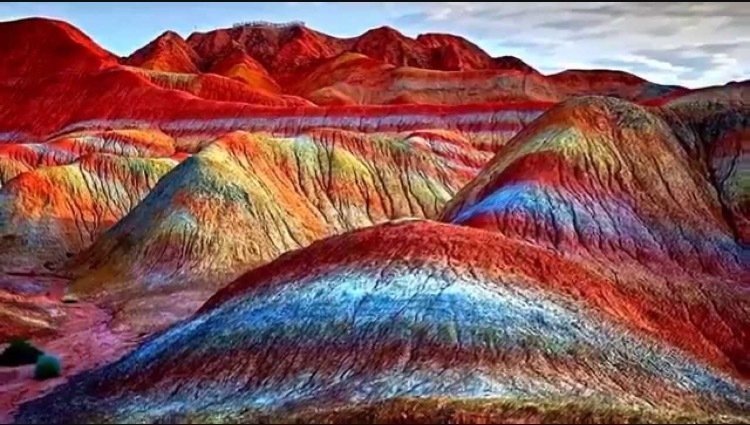Zhangye Danxia Geopark Travel Guide: China’s Rainbow Mountains
Introduction to Zhangye Danxia Geopark
Few natural landscapes in the world look as surreal—or as Instagram-worthy—as Zhangye Danxia Geopark, home to China’s famous Rainbow Mountains. Located in the arid reaches of Gansu Province, this UNESCO-listed site features layered sandstone formations in vivid shades of red, orange, yellow, and even purple, formed over millions of

years.
Walking through this geological masterpiece is like stepping into a painting—one crafted not by human hands, but by wind, rain, and time.
📌 Quick Facts
Location: Near Zhangye City, Gansu Province, Northwest China
Geological Type: Danxia landform (colored sandstone and conglomerate)
Size: ~510 square kilometers
UNESCO Global Geopark: Since 2010
Best Time to Visit: June to September for vibrant colors and clear skies
🧭 How to Get to Zhangye Danxia Geopark
🚆 By Train
From Lanzhou: High-speed train to Zhangye West Station (approx. 4–5 hrs)
From Xining or Jiayuguan: Regional trains or buses available
✈️ By Air
Zhangye Ganzhou Airport connects to major cities like Xi’an and Lanzhou
🚗 To the Geopark
From Zhangye City: ~40-minute drive or shuttle bus
Tours and taxis are available for day trips
🎨 Why Is Zhangye Danxia So Colorful?
The kaleidoscope of colors comes from red sandstone and mineral deposits, laid down over 24 million years and shaped by tectonic plate movement, erosion, and weathering.
Layers of iron oxide, trace minerals, and sediments create the banded colors—red from hematite, yellow from limonite, and greenish hues from chlorite.
It’s a rare geological process found in very few places on Earth.
📍 Top Viewpoints Inside the Geopark
Zhangye Danxia Geopark is well-developed for tourism, with five scenic platforms, each offering a unique view of the landscape.
1. Viewing Platform 1 – Color Palette Hills
Closest to the entrance
Great for first impressions and sunset photography
2. Platform 2 – “Seven-Color Fan”
Fan-shaped ridges resembling a painter’s palette
Stunning layered color contrasts
3. Platform 3 – Best for Sunset
Offers a sweeping view of undulating hills
Popular with photographers—get there early
4. Platform 4 – Panoramic Landscape
The highest viewpoint with expansive views
Windier but less crowded
5. Platform 5 – Hidden Gem
Less visited, peaceful and good for slow exploration
Great for close-ups of rock textures and details
📅 Best Time to Visit Zhangye Danxia
☀️ Summer (June–September)
Best visibility and color vibrancy
Ideal for photography
Be prepared for hot daytime temperatures
🍁 Autumn (September–October)
Cooler temperatures
Slightly fewer tourists
Colors still striking, especially after rain
⚠️ Avoid:
Winter: Cold, snowy, and many trails are closed
Rainy days: Dulls the colors and can make walkways slippery
📸 Photography Tips
Golden Hour: Aim for early morning or sunset
Polarizing filter: Helps reduce haze and enhance saturation
Tripod: Useful for panorama and low-light shots
Drones: Only allowed in certain zones with permission
Pro Tip: Bring a wide-angle lens to capture the vast, layered landscapes.
🎟️ Entry Info & Fees
Entrance Fee: ~75–100 RMB (varies by season)
Sightseeing Bus: Required (~20–30 RMB)
Opening Hours: 6:00 AM – 8:00 PM (in summer)
Note: Buy tickets at the main entrance or through official tourism apps for convenience.
🥾 Walking & Tour Routes
Short Visit (2–3 hours)
Take the sightseeing bus to Platforms 1–4
Spend 20–30 minutes at each platform
Full-Day Hike (6–8 hours)
Visit all platforms on foot for detailed exploration
Pack water, sunscreen, and snacks
Expect strong sun exposure and dry winds
Guided Tours
Available in English and Mandarin
Offers geological background and cultural context
🏨 Where to Stay
In Zhangye City:
Zhangye Holiday Hotel (3-star, budget-friendly)
Zhangye Diamond Hotel (modern and central)
Qilian Pearl Boutique Hotel (comfortable with local charm)
Near the Geopark:
Danxia International Youth Hostel (great for backpackers)
Local guesthouses in Sunan County (rustic and welcoming)
🧠 Cultural Insights
Though Zhangye Danxia is primarily a geological site, the surrounding region has a rich cultural blend:
Hui Muslim communities nearby
Buddhist temples in Zhangye City (notably Giant Buddha Temple)
Influence from Silk Road heritage, as Zhangye was a key stop
🛍️ What to Buy
Danxia-themed postcards and paintings
Handmade Silk Road souvenirs
Local dried fruits and nuts
Minority crafts from the Qilian area
🥘 What to Eat
Local Cuisine Highlights:
Niang Pi Zi (凉皮子): Cold wheat noodles with chili oil
Zhangye Lamb Skewers: Grilled with cumin and spices
Qinghai Yogurt: Tangy and refreshing
Stuffed Buns (Baozi): Filled with lamb or vegetables
Most eateries near the park serve Halal food, especially in Muslim-run stalls.
✅ Suggested 2-Day Itinerary
📅 Day 1: Arrival & Danxia Sunset
Arrive in Zhangye by train or flight
Check into hotel or guesthouse
Visit Danxia Platforms 1–4 before sunset
Return to Zhangye for dinner
📅 Day 2: Morning Light & City Culture
Early morning revisit for golden hour shots
Explore Giant Buddha Temple in Zhangye
Optional: Continue to Binggou Danxia for more rugged formations
🌄 Beyond the Rainbow Mountains: Binggou Danxia
While the main Zhangye Danxia site is famous for color, the nearby Binggou Danxia Scenic Area (~30 km away) offers:
Towering red-rock formations
Natural arches and cliff spires
Quieter trails and unique geological features
Combo Tickets are often available for both sites.
🙌 Final Thoughts
Zhangye Danxia Geopark is more than just a pretty picture—it’s a natural marvel that combines art, science, and awe-inspiring beauty. With well-developed tourist infrastructure, diverse photo opportunities, and convenient access from Zhangye City, it’s an ideal destination for nature lovers, geologists, and travel photographers alike.
If you’re planning a deeper exploration of China’s Silk Road corridor or Gansu Province, make sure Zhangye’s Rainbow Mountains are at the top of your list.
